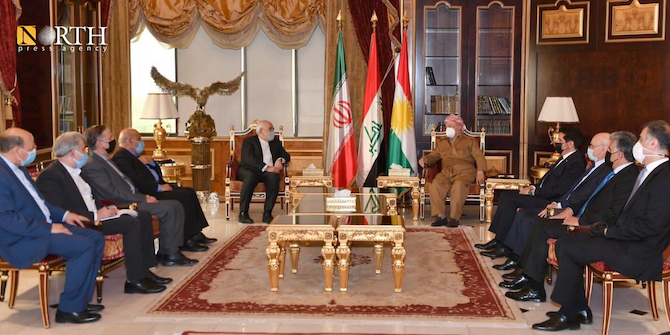by Hamzeh Hadad

For the past three years, Baghdad has played host to several regional conferences and mediated talks between Tehran and Riyadh. This has been the post-ISIS strategy for Iraqi leaders, attempting to prevent Iraq from being a battleground for proxy warfare. Despite these efforts, Iraqi sovereignty continues to be violated by allies and neighbours. Furthermore, the lack of internal cohesion dilutes any international efforts Baghdad attempts. Therefore, Baghdad needs to resolve fundamental issues within Iraq, most notably the Kurdistan Region, before directing its energy outwards.
Last spring, at a conference at the Brookings Institution, President Barham Salih described the important view that ‘we need an Iraq that is at peace with itself and at peace with its neighbours’. Being both the President of Iraq and a Kurdish leader, President Salih is uniquely equipped to understand the weight of domestic peace in Iraq. Despite many such statements, the presidency–premiership divide and the competition between Baghdad and Erbil demonstrate the difficulties in achieving this. Rather than prioritise domestic peace, nearly every powerful actor in the Iraqi state has shifted their focus to international relations. This, of course, has brought much media attention to Iraq and has created perceptions of efficacy and recovery that belie the reality on the ground.
Although American-Iranian tensions occupy the headlines, when it comes to infringement on Iraqi sovereignty, Turkey is equally complicit. The Turkish military has gone beyond the Iraq-Turkey border and is occupying at least 20 kilometres of Iraqi territory in the Kurdistan Region. This is in addition to the 37 Turkish military bases in the Kurdistan Region of Iraq and Ninawa governorate under the pretence of fighting the Kurdistan Workers’ Party (PKK). Turkey’s extended presence has allowed them to launch continued air strikes in areas like Sinjar. Once ravaged by ISIS, these targeted communities continue to face displacement, unable to return and rebuild, leaving hundreds of thousands of Yazidis in camps for internally displaced persons. A community that has faced genocide and only been met with empty promises should be the shared priority of Iraqi leaders in Baghdad and Erbil.
Turkey is not the only sovereign actor attacking Kurdish rebel groups in Iraq. Iraqi Kurdish media have reported that Iran has constructed several roads and installed outposts in Erbil governorate, targeting the Kurdistan Democratic Party of Iran (KDPI). With multiple violations on Iraqi sovereignty that threaten the security of citizens, it is unfortunate that leaders in Baghdad and Erbil are unwilling to sacrifice their personal links with Ankara and Tehran in order to jointly defend Iraqi sovereignty.
Both sets of leaders are complicit in Iraq’s internal division. On one hand, the Kurdistan Democratic Party (KDP) continues to instrumentalise public emotions surrounding the failed referendum of 2017, which did not advance the cause of Kurdish independence while jeopardising ties with Baghdad. On the other hand, despite the last two prime ministers having close ties with the two major Kurdish political parties to the point of Mustafa Al-Kadhimi describing it as ‘a golden era’, there has been no implementation of the Sinjar Agreement or a resolution to the disputed territories. In addition, the annual federal budget allocation debates should have been resolved through routinised financial procedures rather than aggravating tensions on a monthly basis. Ultimately, the responsibility falls upon Baghdad, which has been led by an Arab prime minister and a Kurdish president since 2005.
Instead, politicians have neglected these internal divisions in favour of focusing on foreign affairs, particularly regional conferences. Even if these international conferences were to lead to positive developments, they neither directly address sovereign violations towards Iraq nor indirectly seem to be lessening them. Regardless, a weak Iraq does not serve as a promising partner to its neighbours. Baghdad is putting the cart before the horse. Resolving its internal issues and having a stronger federal Iraq, would make it a more impactful actor in the international arena.
As it stands, Iraq’s foreign policy is incoherent because it is represented by two opposing sides: diplomatic Iraqi missions and Kurdistan Regional Government (KRG) representative offices. The Iraqi constitution designates foreign policy exclusively to the federal government. While the constitution also permits regions to have representative offices within Iraqi embassies, the current KRG representative offices have no connection to the Iraqi Ministry of Foreign Affairs. By contrast, Scotland has foreign offices to seven foreign capitals but all are based within the British Embassy, except for Brussels, which is based in the EU district. To make matters more confusing, the Iraqi foreign minister has been a Kurd from the KDP for 12 of the last 18 years.
The purpose of consociationalism is to ensure equal representation for all groups. However, that makes little sense if the KDP is demanding the Iraqi Foreign Ministry, while pursuing their own independent foreign policy. This leads back to the lack of ownership of the Iraqi state by its politicians, who exhibit a tendency to extract all the resources they can, rather than build state institutions. For many, this stems from a history of serving as opposition to the Iraqi state prior to 2003, which they cannot seem to shake off nearly two decades later.
As its sovereignty continues to be violated, Iraq cannot afford to be led by those who do not believe in it. Difficult talks need to take place between Baghdad and Erbil before conferences are held with neighbours. In the region, Iraq is poised to convene and mediate amongst others, but it cannot do so with an incoherent foreign policy and a divided domestic reality. The same actors who host these talks and conferences would be well advised to organise them internally so that future Iraqi representation can convincingly deter violations of sovereignty. This can only be done by representing a united Iraqi front.




